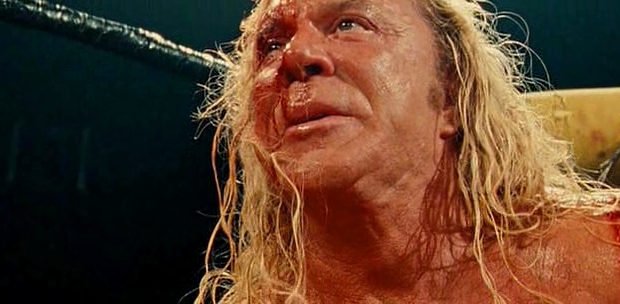The Wrestler Review
There haven’t been a huge number of pictures made about American pro-wrestling. In fact, the only ones that spring to mind are Sylvester Stallone’s 1978 drama Paradise Alley, the campy 1980s Hulk Hogan epic No Holds Barred and the excellent documentary Beyond the Mat. The perils with a pro-wrestling movie are obvious: how do you create a thrilling movie out of a sport so wildly theatrical and in which the outcome is rigged? Director Darren Aronofsky and screenwriter Robert D. Siegel overcome this potential stumbling block by making The Wrestler a tragi-comedy that’s more about a man than the matches.
Randy ‘The Ram’ Robinson (Rourke) is now in his 50s – broke, living in a trailer and a shadow of the successful wrestler he once was. For in his heyday posters of The Ram adorned bedroom walls all around the country, and at weekends Randy relives the guise of The Ram at half-empty signing sessions and matches at miniscule venues. To maintain his muscle-bound physique, he uses a combination of punishing exercise regimes and a dangerous cocktail of performance-enhancing drugs. But after a heart attack, Randy’s doctors tell him that he risks dying if he wrestles again…
Randy is a tremendous character: deeply flawed, but impossible not to feel for. Along with many of his wrestling buddies, he’s a man desperately trying to cling onto the success he once had, and when he’s in the ring he is offered the chance to escape from his soul-sucking supermarket day job (viewers may recognise his smug manager as Todd Barry, who played Todd in Flight of the Conchords). His eyesight is beginning to fail and his heart is going – but for Randy, ‘retiring’ means becoming a nobody.
When he’s not wrestling opponents in the ring, Randy is wrestling the demons that plague the rest of his life. We get the impression that, in his younger days, he put the trappings of success over caring for his family. The older Randy, realising that his life outside of the ring is essentially an emotional void, tries to make amends by trying desperately to establish communication with his estranged daughter (Rachel Evan Wood); but the wrestler’s selfish and self-destructive side always threatens to ruin everything.
In his spare time he hangs around a stripclub, where he befriends a stripper named Cassidy, played by Marisa Tomei. Like Randy, Cassidy’s job demands her to possess an unnaturally perfect body that becomes all the more difficult to maintain as she gets older. She is also another figure who has difficulty in establishing meaningful emotional connection: her job is all about putting on a performance, and she’s very reluctant to reveal anything about her private life to clients – a policy that is thrown into confusion with The Ram.
Mickey Rourke has been having ‘comebacks’ for years, so we won’t throw that word around here. What we will say is that this is one of the standout performances of his career, the actor channelling every inch of his troubled, self-destructive past. Tomei, an actress we never see enough of these days, is also superb, and she brings a subtle warmth to the emotionally-hardened Cassidy.
Like all the best sports movie, you don’t need to be a wrestling fan to appreciate The Wrestler (though WWF fans will undoubtedly get an extra kick out of the colourful costumes and elaborate wrestling names – and Randy himself looks remarkably similar to a facepaint-free Ultimate Warrior). It’s first and foremost a character piece about lost souls desperately craving recognition of their existence.
Though tragedy and pain are around every corner, this is more realist comedy than wallow in misery, with most of the laughs coming from the elaborate tactics used in the ring (witness Randy’s bemused consent when an opponent asks him if he’s “okay” with being stapled), or from seeing just how out of touch the aging Ram is (a neighbourhood kid politely shows his disdain for an old Nintendo wrestling game that Randy insists on playing). But Aronofsky never cruelly sniggers at the sport or those that partake in it, and instead this is more of a celebration of people who add colour to the drabness of everyday life.
The Wrestler was the movie that restored Aronofsky’s reputation at Cannes in 2008, after his previous film, the mind-bending fantasy The Fountain, was booed at the festival two years earlier. The Fountain (like Aronofsky’s debut Pi) was a truly original picture that is likely to be reassessed as a classic in years to come, while 2000’s Requiem for a Dream was a masterpiece of modern filmmaking. The Wrestler, with its gentle narrative development and documentary-style visuals, is Aronofsky’s least flashy movie to date, but it is also his best. A bodyslamming success.
Last modified on








